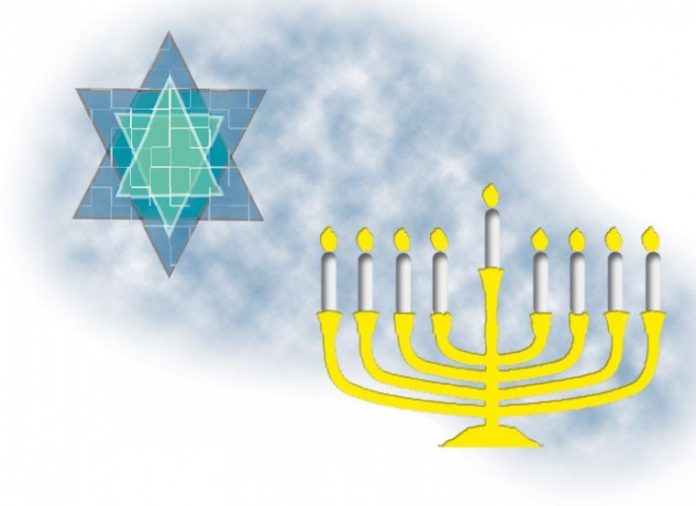MORGAN HILL
– To your average Christian, Hanukkah is to the Jewish as
Christmas is to their own beliefs. To them, the menorah is a
substitute to the Christmas tree. But nothing could be further from
the truth.
MORGAN HILL – To your average Christian, Hanukkah is to the Jewish as Christmas is to their own beliefs. To them, the menorah is a substitute to the Christmas tree. But nothing could be further from the truth.
According to Morgan Hill’s Congregation Emeth Rabbi Yitzhak Miller, comparing the two holidays is like judging apples and oranges. And while Jews are flattered to be given some attention during the holidays, they’d rather you save your well-wishes for their high religious holidays.
“It’s a tough balance because people are trying to include a minority culture,” said Miller, who noted that Jews make up about 1.5 percent of the world population. “Celebrating a minor holiday like Hanukkah and elevating it to the level of a major Christian holiday like Christmas is very much appreciated by Jews, but it really distorts the importance Hanukkah has in the Jewish tradition.”
Judaism has just a few holidays that are held to the level Christians place Christmas, and Hanukkah isn’t one of them.
“In Judaism, we have what are known as major holidays that are mentioned in the Torah, and the minor holidays, which mean they are post-Torah, and then modern holidays,” Miller said.
The major holidays include three pilgrimage festivals of Passover, Shavuot and Sukkot and the High Holy Days, which are a combination of Rosh Hoshana and Yom Kippur.
The modern holidays include Holocaust Remembrance Day and Israel Independence Day, while Hanukkah, mentioned in the post-Torah book of Maccabees, is the best-known of the two minor holidays. The other is Purim, which comes from the book of Esther.
“Hanukkah and Purim actually celebrate military victories,” Miller said. “Hanukkah celebrates the victory of Judah Maccabee’s army over the Greeks in Jerusalem.”
But it is also the story of a power struggle caused by the beginnings of a split in the Jewish leadership structure that leaves its mark on Hanukkah. That split was between the Biblical Jews, who had been continuing their tradition of sacrifices of animals to God since the Jews first left Egypt, and the Rabbinical Jews, who had begun replacing the sacrifices with prayer.
The Biblical Jews would make three regular sacrifices each day, offered by a high priest on behalf of the community. There also were several personal sacrifices made to God for various reasons.
“To the Biblical Jews, God lived in the temple in Jerusalem,” he said “He could not be worshipped legitimately anywhere else.”
The split in the Judaism began in 586 B.C.E. on the Jewish calendar, when the Jews’ first temple to God was destroyed and the Jews were forced to live in Babylonia. It was there that Rabbinical Judaism began. In 538 B.C.E., King Cyrus of the Persian Empire freed the Jews and allowed them to return to their homeland, but many Jews chose to stay and became the foundation of Rabbinical Judaism.
The story of Hanukkah revolves around the Biblical Jews who made the return to Jerusalem and rebuilt the temple. Maccabee was the heir to the throne in Jerusalem in 165 B.C.E when a group of Greek Syrians invaded Jerusalem and kicked the Jews out of the temple. For two years, the Jews were again living without their God. Finally, in the winter of 163 B.C.E., Maccabees brought his army back and took Jerusalem back to get the sacrifices to God running again. When the Jews returned to Jerusalem, they held an eight-day celebration that became Hanukkah. But Miller said the celebration actually comes from another Jewish holiday.
“We know that what they celebrated was the festival of Sukkot,” he said about the eight-day harvest festival the Jews usually celebrate in the fall. “Hanukkah was born as a celebration of Sukkot two years and four months late.”
In 70 C.E. (Common Era), the second temple of the Biblical Jews was destroyed, this time by the Roman Empire, in essence ending the strife between the sects in the religion. In 500 C.E., Rabbinical Jews codified the Talmud, a set of books that would lay out the rules of Judaism. When it came to the story of Hanukkah, the story of Maccabees, which had been celebrated for nearly 650 years, was replaced with the now-commonly known story about one day’s worth of oil lasting for eight days at the will of God. Miller said the story had never appeared in writing before that time, leaving its authenticity up to belief.
“All of a sudden, Hanukkah isn’t celebrating Maccabees,” Miller said. “All of a sudden, it’s celebrating God.”
Likewise, the book of Maccabees, which can be found in a traditional Catholic Bible, was left out of the Talmud by the Rabbinical Jews. The story of Maccabees slowly drifted away, and now isn’t even known by many Jews.
“Most of today’s Jews know the story of the oil better,” Miller said about the traditional Hanukkah story most have heard about one day’s worth of oil lasting for eight days of candlelight. “For many of the Jews that didn’t study Judaism past 12 or 13 years old, they still have a kid’s understanding. (Telling them the true story of Hanukkah) is like you told them there’s no Tooth Fairy.”
However, Miller said the most important part of the holiday to to understand how much the story behind is a result of the impact of the separate branches of Judaism two thousand years ago.
“I think that’s the most interesting part of Hanukkah,” he said. “We can see the debate that was happening at the time between the Priestly Judaism of Jerusalem and the Rabbinical Judaism of Babylon and Egypt.”
The common celebration of Hanukkah today usually includes the well-known symbols of the menorah, dradle and the eating of latkes, or potato pancakes. While many families give gifts for each day of Hanukkah, Miller said that tradition is strictly American and has no basis in the faith.














